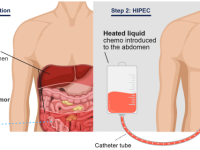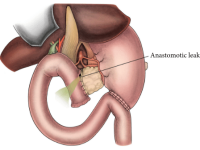Surgical Oncology Research Laboratory
R&D > Laboratories > Surgical Oncology Research Laboratory -Dr. Eran Nizri >>

Our Vision
Our lab aims to advance medical knowledge and improve patient outcomes by innovative basic and translational research in the field of surgical oncology. Our vision is to develop new and transformative technologies and introduce them into clinical practice. Our unique position as a research lab affiliated to a busy surgical oncology department, supplant us with human biological samples and a clinical point of view. On the translation aspect, our lab has a special focus on biomarkers for efficacy of heated intra-peritoneal chemotherapy (HIPEC) for patients with peritoneal surface malignancies. In addition, we are exploring novel diagnostic modalities for severe post-operative complications, such as anastomotic leakage. On the basic science aspect, we are interested in the immunological response to peritoneal metastasis from colorectal cancer, and have developed specific experimental model to decipher the tumor micro-environment of peritoneal metastases. We are committed to fostering a culture of collaboration and innovation, bringing together physicians and scientists from diverse backgrounds to tackle major problems in cancer care.

Contact Us
Primary Investigators

Dr. Eran Nizri , Lab PI
Email: erann@tlvmc.gov.il

Kelly Lipczyc , Lab manager
Phone: +972-58-5109645
Email: kellyl@tlvmc.gov.il
Address
Sammy Ofer Heart Building
10th floor
Room 64-65
6 weizmann st., Tel Aviv

Research
| There is an ongoing debate on the effectiveness of heated intra-peritoneal chemotherapy (HIPEC) in the management of patients with peritoneal surface malignancies (PSM). HIPEC is intended to kill any remaining tumor cells in the peritoneal cavity after the macroscopic disease has been surgically resected but there is currently no widely accepted method of measuring chemotherapy effectiveness. Therefore, it is important to establish the efficacy of HIPEC in treating patients with peritoneal malignancies, as well as to develop biological criteria that will help us quantify the effect of HIPEC and its relationship with long-term survival. Our aim is to measure specific markers present in HIPEC effluent and establish a correlation with long-term outcomes. |
| Anastomotic leakage is a relatively common postoperative complication, occurring between 5% and 15% of surgeries performed along the digestive tract. Despite improvements in surgical techniques and perioperative management, the overall incidence of leakage does not appear to be decreasing. Such a leak involves a serious intra-abdominal infection, which may lead to sepsis and life-threatening complications. Early diagnosis of leaks is crucial because timely intervention can prevent the patient’s condition from deteriorating and causing damage to multiple systems. Early detection and prediction will allow the administration of antibiotics ahead of time, as well as the scheduling of surgeries or other medical operations designed to control the leak. Our working assumption is that there exist biological markers which can help us predict when a patient is at risk of leaking ahead of time. By analyzing abdominal fluid extracted from drains left during surgery we may be able to detect clues to the development of a leak before it becomes a serious problem. |
Adenocarcinoma of the breast is the most common cancer in women in the western world, and the second leading cause of cancer-related deaths. Studies conducted over the last decades have demonstrated that breast conserving surgery (BCS), i.e. lumpectomy, provides similar long term survival to resection of the whole breast, i.e. mastectomy. However, BCS pose a significant cosmetic challenge, as it mandatorily creates breast asymmetry due to resection of the tumor mass and its adjacent healthy tissue from one breast. To address this issue, intensive research has been dedicated to tissue engineering-based solutions. Tissue engineering seeks to develop biological substitutes utilizing cells and materials that restore, maintain, or improve tissue function. The focus of this study is to develop a personalized 3D-printed scaffold for tissue regeneration to be used in BCS.
Gallery



Our Team
Current Staff
Researchers
- Kelly Lipczyc, MSc
Past Staff
- Shoshi Bar David, MSc
Current funding

Highlighted Publications
Geva R, Alon G, Nathanson M, Bar-David S, Nevo N, Aizic A, Peles-Avraham S, Lahat G, Nizri E. Ann Surg Oncol. 2023 May;30(5):2657-2663. |
Alon G, Geva R, Lahat G, Nizri E. Ann Surg Oncol. 2023 May;30(5):2664-2665. |
Immunological effects of heated intraperitoneal chemotherapy can be augmented by thymosin α1.
Nevo N, Lee Goldstein A, Bar-David S, Abu-Abeid A, Dayan D, Lahat G, Nizri E. Int Immunopharmacol. 2023 Mar;116:109829.
More Publications >>
Nevo N, Lee Goldstein A, Bar-David S, Natanson M, Alon G, Lahat G, Nizri E. Int Immunopharmacol. 2022 Oct;111:109166.
Weksler Y, Hoffman A, Green E, Kyzer M, Nevo N, Gerstenhaber F, Greenberg R, Klausner JM, Gutman M, Lahat G, Berger Y, Geva R, Nizri E. Surg Oncol. 2022 Sep;44:101848.
Innate inflammatory markers for predicting survival in retroperitoneal sarcoma.
Netanyahu Y, Gerstenhaber F, Shamai S, Sher O, Merimsky O, Klausner JM, Lahat G, Nizri E. J Surg Oncol. 2020 Dec;122(8):1655-1661.
Bahat AV, Bar-David S, Brooks A, Aizic A, Greenberg O, Wolf I, Klausner JM, Lahat G, Nizri E. Anticancer Res. 2020 Nov;40(11):6457-6464. |
Bar-David S, Larush L, Goder N, Aizic A, Zigmond E, Varol C, Klausner J, Magdassi S, Nizri E. Sci Rep. 2019 Jun 12;9(1):8566. |
Friedman-Levi Y, Larush L, Diana M, Marchegiani F, Marescaux J, Goder N, Lahat G, Klausner J, Eyal S, Magdassi S, Nizri E. Surg Endosc. 2018 Feb;32(2):963-970.







